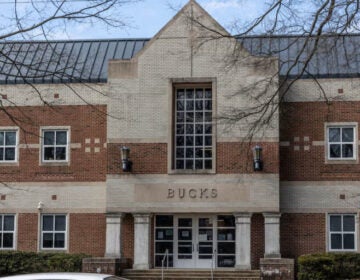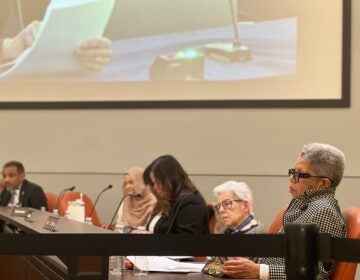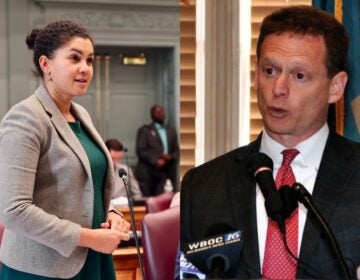Pa. Senate passes bill calling for dramatic interventions at bottom performing schools
 Photo via ShutterStock) " title="shutterstock_50419261" width="1" height="1"/>
Photo via ShutterStock) " title="shutterstock_50419261" width="1" height="1"/>
(Photo via ShutterStock)
In a bipartisan 42-9 vote, the Pennsylvania Senate approved a school code bill Thursday evening that would require the state to take drastic intervention at five “persistently low achieving” schools per year.
The “opportunity schools” legislation says the state secretary of education will have discretion to choose the five schools from a list of chronic low performers as measured by the state’s school performance profile index. Only a “school district of the first class” would be affected: namely, Philadelphia.
The schools would then come under the purview of the Pennsylvania Department of Education for at least three years.
The education department would have five intervention options:
Turn over operations of the school to an outside education management organization
Convert the school into a neighborhood-based charter
Close the school and facilitate transfering students to higher performing schools
Authorize a new charter and guarantee admission preference to students who reside in the area around the low performing school
Replace the principal and at least half of the school’s staff
A school district or charter school can appeal the designation of its school as a “chronic low performer” within 30 days.
As part of its power as overseer of the “opportunity schools,” the Pennsylvania Department of Education would have wide leeway to make staffing changes as it sees fit.
The department could hire employees and managers who do not hold state certification. Employees could be reassigned, suspended or dismissed at will.
Each of the seven state senators who represent Philadelphia voted for the bill.
Sources say the votes were a necessary tradeoff in order to secure the roughly $100 million funding boost that would come to city schools as part of the budget framework agreed to by Gov. Tom Wolf and Republican legislative leaders.
The $100 million boost nearly equals the annual funding Philadelphia lost when the state eliminated the “charter reimbursement” line-item. That part of the Pennsylvania budget helped the district cover the added, systemic costs incurred when students enroll in charters. That was cut in the first budget passed during former Gov. Tom Corbett’s tenure.
This legislation appears to be a compromise version of a bill forwarded by state Sen. Lloyd Smucker (R-Lancaster) earlier in the year that was modeled, in part, after Tennessee’s “achievement school district.”
Smucker’s plan called for the state to make drastic interventions in the bottom five percent of schools on the School Performance Profile — affecting 147 schools. Nearly 100 of them are in Philadelphia.
A report released this week found Tennessee’s state interventions to be “ineffective.” Leaders there have asked for patience.
A spokesman for Gov. Tom Wolf did not respond to a request for comment in time for publication.
The Philadelphia School District was not ready to comment on the bill.
Susan Gobreski, executive director of Education Voters PA, blasted the “opportunity schools” provision.
“It would be really refreshing to see the legislature focus on educational strategies that have some basis in research, that are focused on children and strengthening schools instead of weakening them,” she said. “But given the dysfunction of this legislature, we sadly have no hope of them taking action that could actually help.”
Some of Philadelphia’s most fervent proponents of school reform decried the bill as well, but for very different reasons.
Mike Wang, executive director of the Philadelphia School Advocacy Partners, an arm of the Philadelphia School Partnership, lamented what he sees as a lack of urgency.
“At this point, there is no real accountability in this bill,” said Wang, “That is deeply concerning. By the District’s own count, Philadelphia has 83 schools that need intervening. This bill offers no relief for those families.”
The Philadelphia School District was compelled to begin accepting new applications for charter schools in 2014, after years of moratorium. This change came based on a tradeoff made among state lawmakers in a piece of legislation that allowed the city to hike its tax on cigarettes to fund schools.
The district has been overseen by the majority state-appointed School Reform Commission since 2001.
The school code bill will next head to the Pennsylvania House of Representatives — where members have pushed back against the tax increases implicit in the larger budget framework agreement.
Correction: A previous version of this story said that eight state senators represent Philadelphia.
WHYY is your source for fact-based, in-depth journalism and information. As a nonprofit organization, we rely on financial support from readers like you. Please give today.





